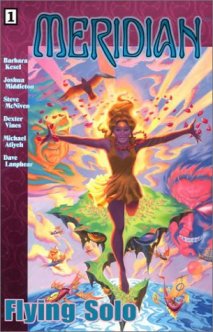| Meridian:
Flying Solo
When Crossgen
first appeared on the comics scene a few years ago, I gave
it a shot. I read the first couple issues of Scion, Meridian,
Mystic, and I even grabbed and issue of Sigil.
I'm sorry
to say that none of the titles really struck a chord with
me. And yet I have the utmost respect for Crossgen Comics.
Mark Alessi, CEO of Crossgen (or director or some king-like
honorific), is bringing fresh ideas into the comic industry
and helping to create a more stable market for the medium
we all love.
The latest
collection of Meridian demonstrates Alessi's creativity
in marketing. This new trade paperback collection of the first
seven issues is published under the "Traveler's Edition"
heading. The size of the book has been cut by about a third,
with the pages shrunk proportionally, and it's being offered
for $9.95.
What surprises
me the most about this new publishing practice is that no
one has thought of it before in reference to comics. Books
have been doing this for years. Under normal circumstances,
books are published first as a hardcover for about $25; then
they get released as a trade paperback for between $12 and
$16. And then comes the mass-market paperback, for a whopping
$6.99.
If the
consumer is willing to wait, they can get the same story dirt-cheap
(granted, it may not fit as snugly on the bookshelf, but who
uses bookshelves? The Pile System has always worked well for
me).
When it
comes to comics, releasing two different bindings of the same
book is nothing new in the graphic novel/trade paperback business,
but it's usually offered as hard and soft covered, making
you shell out an extra $10 for compressed cardboard and a
dust jacket. Releasing Meridian first as a regular
sized trade and then as a Traveler's Edition is a stroke of
genius: we get 7 issues of comics for $10. Who doesn't like
the sound of that deal?
Of course,
in order for you to want to experience the savings, you have
to like the premise of the comic. Meridian is strict
fantasy. Set on a world where the ground is barren and caustic
gasses corrode away any attempts at ground civilizations,
the inhabitants of this world have made their homes in the
skies on giant floating cities. Meridian is an air-shipbuilding
town and home to the book's protagonist, Sephie. Her father
Turos is the Minister of Meridian, and brother to Ilahn, the
Minister of Cadador.
When some
otherworldly beings (the same beings I assume give the "sigil"
to the other heroes of the Crossgen universe) bestow upon
Ilahn and Turos great powers, Turos mysteriously falls dead
and unwittingly passes his power to his daughter. Ilahn uses
the death of his brother as an opportunity to put into motion
a plan to take over Meridian, using his newfound powers and
the military of Cadador to add the wealthy colony to his own
holdings.
Sephie
soon realizes her uncle's treachery. With the aid of her own
powers and sky-sailing know-how, she manages to escape him
and try desperately to return home to rule as Minister of
Meridian.
The story
is simple and solid, and Barbara Kesel writes some very good
dialogue and better than good action sequences. The only problem
with it is the one that I've heard most associated with Crossgen:
that it moves too slowly.
It does
move somewhat slowly, and maybe Crossgen is addressing this
problem by extending the traditional trade collection from
six issues to seven, but it's still hard to stay glued to
the page. It's kind of puzzling: in the first issue it takes
one night for Ilahn's plans to come to fruition, and yet it
takes Sephie in the vicinity of three to figure out her uncle
is a functionally bad man.
The plot
doesn't really advance so much as stroll along. One thing
I do like is that Kesel writes the characters as not being
"in the know" when it comes to their powers. Both
Sephie and Ilahn take time to learn what exactly their powers
can do, and even then it isn't fully explained. It's a good
hook for the writer to pull the reader back in on.
One thing
that stands out rather positively is the art on the book.
I really, really like Joshua Middleton's penciling style.
His people are very emotive and he draws figures extremely
well and faintly cartoony (but not like a cartoon book, don't
worry).
He also
works well with the concept of the book, creating beautiful
and ornate structures and airships, not to mention how beautiful
he draws Sephie, especially in wind effects.
Another
chunk of praise should be broken off for the colorist Michael
Atiyeh. The colors are amazing in Meridian: rich and
vibrant sunsets and sky-scapes, well toned skin colors and
textures of fabrics, and his deft touch with light shadows
adds more dimension to the characters as well. The story may
drag, but the art is solid stuff.
I grabbed
Meridian for two reasons: 1) to see if the book was
something I would like, and 2) to feel the heaviness of my
wallet as I saved mucho dinero and not been forced to part
with my George Washingtons (at least not too many of them).
It reads
more like a book meant for the young adult or teenager, but
that doesn't mean it's not enjoyable. If you find yourself
wandering around your comic chop (salivating as I do every
week), looking for something to drop a $10 bill on, try it.
Personally, I'm waiting for books like Negation and
The Path to get the Traveler's treatment, but I'll
keep Meridian in mind
Meridian Traveler:
Flying Solo
|






